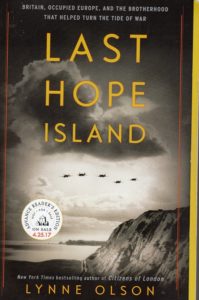Book Review: Last Hope Island by Lynne Olson
Disclaimer: I received this Advance Review Copy as a Goodreads giveaway for the purposes of this review. No other compensation was requested or offered. Some changes may be made before the final publication date of 4/25/17–for example, the index isn’t included in this version.
This book opens with Movie Night at the German embassy in Norway, April 1940. The film shown to Norwegian government officials was Baptism of Fire, a documentary about the invasion of Poland in 1939. Afterwards, the German ambassador made a speech that roughly translates into English as “Nice country you Norwegians have here. It’d be a shame if anything happened to it.” Four days later, the Nazis invaded.
Rather than turn over the reins to local fascist Vidkun Quisling as the invaders wanted, King Haakon VII and the remnants of the Norwegian government fought a running battle until they could be evacuated to Britain, where they joined other European governments in exile. Soon, this “Last Hope Island” and the embattled people sheltered by it were the only thing standing between Nazi Germany and complete victory on the Western Front.
This volume discusses various aspects of the joint efforts of Occupied Europe and the British against the Nazis. From the early gift of an ULTRA machine by Polish cryptographers so that the British could read German codes, through the contributions of combat-experienced Polish and Czech pilots in the Battle of Britain, the Norwegian gift of its merchant marine, and Resistance fighters of all descriptions, the governments in exile (and General de Gaulle’s Free French) gave invaluable help. The BBC’s transformation from a stuffed-shirt government branch to a voice of truth and freedom that brought words of encouragement from exiled leaders is detailed.
But all was not beer and skittles. Pre-War resentments and cultural attitudes often caused misunderstandings and in-fighting. As it turned out, the British didn’t have the world’s best spy agency, just the world’s best spy novelists, with both MI6 and the Special Operations Executive (who were supposed to be creating and working with Resistance networks) making bungle after bungle. And once the Soviet Union and the United States entered the war, Britain’s focus shifted to appeasing these powerful allies even when it went against the interests of the occupied countries. (This culminated in the shameful betrayal of Poland and Czechoslovakia to the Russians.)
After the war, while the formerly occupied countries of Europe were and remained thankful to Britain and its people for all the help given, they also knew that they couldn’t rely on the island nation to protect them. So new alliances were formed, and greater cooperation established, eventually leading to the creation of the European Union.
Quite a bit of this is material I had not known before, partially because much of my WWII history reading was done in the 1970s, while some of the source documents were still classified, and partially because my sources were USA-centric. Various people involved get a stronger focus because they survived the war and became famous, such as Audrey Hepburn, who was trapped in occupied Holland.
There are scattered illustrations (possibly more in the finished product), extensive endnotes, a bibliography, and the full book will have an index. The writing is clear, and this book should be suitable for bright high school students and up.
The benefits of hindsight are very evident throughout (the end material may or may not be updated to reflect Brexit.) I do recommend this book to those curious about the relationship between Britain and Occupied Europe; however it is at the same time a fairly narrow subject, but covering a multitude of intersecting fields. I would recommend having to hand a more general WWII history for reference, and checking the bibliography for more specific works on individual people and incidents. (The author explains in her foreword that Greece and Yugoslavia were completely cut out of the book due to their different circumstances, so readers with an interest in those countries will definitely need to seek out other material.)

